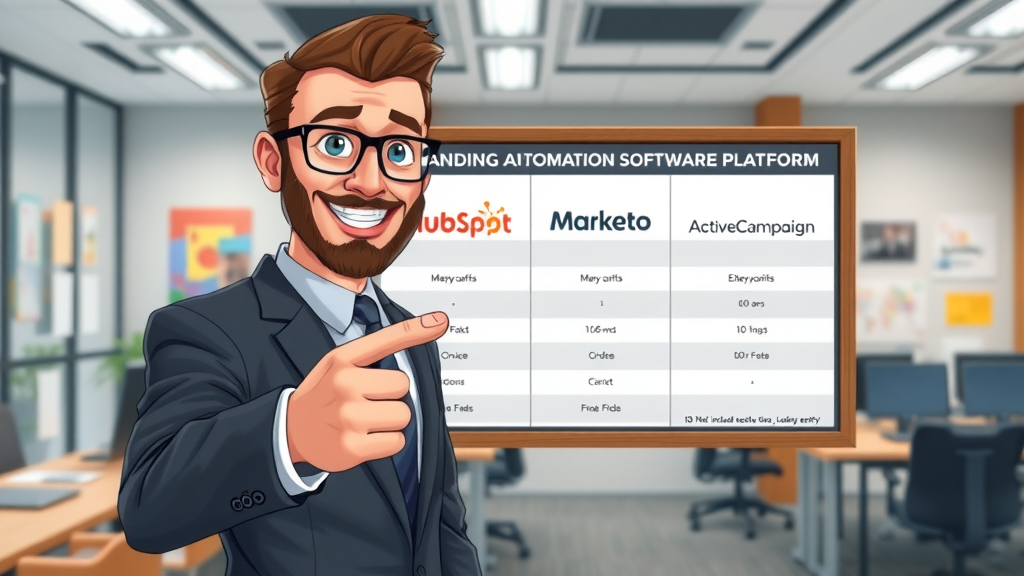Did you know: Businesses using marketing automation tools can boost sales productivity by an astonishing 14.5% while cutting marketing costs by 12.2%? If you’re still spending countless hours on manual marketing tasks, you’re missing out on time-saving technology that your competitors have already embraced. In this comprehensive guide, you’ll uncover how automation platforms transform your workflow, fuel engagement, and scale your growth—all while freeing up your team to focus on strategy and creativity.

Unlocking the Power of Marketing Automation Tools: Surprising Facts That Will Change How You Work
In today's digital marketing environment, leveraging marketing automation tools isn’t just about keeping up—it’s becoming the new standard. Whether your business is B2B, e-commerce, or service-based, these platforms rapidly transform repetitive processes and elevate your entire marketing team's efficiency. Automation tools can handle a variety of marketing tasks, from social media scheduling to customer data management, freeing your team to pursue creative, high-value projects. Imagine automating campaign launches, nurturing leads, or synchronizing sales data—without ever copying data between systems by hand.
These workflow upgrades aren’t limited to big enterprises. With a range of automation software available, even small and mid-sized businesses now streamline operations and personalize their customer journeys. Ultimately, your marketing process becomes more predictable and scalable, making every marketing campaign easier to launch, measure, and optimize. Let’s explore what happens when you unlock the power of automation platforms within your marketing efforts.
A Look at the Growing Impact of Marketing Automation Tools on Time and Productivity
Marketing automation platforms are more than just trendy software—they're becoming essential to business growth and operational agility. As organizations adopt automation tools, they consistently report a reduction of repetitive tasks, accelerated lead generation, and enhanced communication with their sales teams. Sales teams spend less time managing manual leads and more time converting qualified prospects, which directly impacts your bottom line.
As stated by Nucleus Research:
"Businesses that use marketing automation tools can see up to a 14.5% increase in sales productivity and a 12.2% reduction in marketing overhead." – Nucleus Research
This increase in productivity doesn’t just mean saved hours—it means your marketing team can focus on high-growth opportunities, test new tactics across multiple channels, and respond faster to market trends. Technology is now a true force multiplier for every marketing function.
How Marketing Automation Tools Revolutionize Your Workflow
The greatest benefit of incorporating automation tools into your marketing process is the radical shift in how teams manage day-to-day tasks. By offloading repetitive processes—like email marketing sequences, follow-up reminders, and campaign scheduling—marketing automation software grants creative freedom and strategic control to your team. With the right automation platform, you can launch complex marketing campaigns across multiple channels without losing consistency or wasting time.
These changes don't just benefit the marketing department. When sales teams are looped into the streamlined workflow, lead generation improves and the customer experience is enhanced from the very first touchpoint. Automated nurturing, triggered campaigns, and targeted push notifications help maintain ongoing engagement, even after business hours. Let's see how the right automation software can optimize every stage of your workflow.
Streamlining Repetitive Tasks with Automation Software
The power of automation software lies in its ability to eliminate repetitive tasks that once bogged down marketers. Instead of spending hours manually segmenting contact lists, scheduling posts to social media, or tracking lead statuses in spreadsheets, now smart automation platforms do the heavy lifting. With prebuilt triggers and intelligent task sequences, common workflows become hands-off procedures that run smoothly in the background.
For example, imagine an automation tool that instantly assigns new leads to your sales team, notifies marketing of hot prospects, and delivers a personalized email campaign based on each recipient’s behavior. These automated flows free both your marketers and sales teams to spend more time on relationship building, creative ideation, and business strategy—all of which drive significant ROI. And because automation software integrates easily with CRM and analytics systems, your customer data stays accurate and actionable.

Enhancing Customer Engagement via Personalized Automation Tool Campaigns
Customer engagement is the heartbeat of long-term business growth. Today’s marketing automation tool offers personalized automation campaigns that go far beyond generic email blasts. Modern automation platforms can segment audiences based on detailed behavior, preferences, and historical data, sending truly tailored messages across email, text, and social media channels. Whether it’s a birthday offer, a follow-up survey, or recommendation for related products, personalization at scale is now possible, thanks to these tools.
Automated personalization doesn’t just increase open rates; it deepens the entire customer journey. Businesses using these platforms report higher click-through and lead conversion rates because each message feels more relevant and timely. For growing businesses, this means more loyal customers, reduced churn, and bigger returns with every campaign. The era of one-size-fits-all marketing is over.
Marketing Automation Software: Key Features That Save You Hours Every Week
Leading marketing automation software solutions go far beyond email marketing or social scheduling—they centralize every aspect of your digital marketing process. Core features include campaign management, lead generation and nurturing, customer journey mapping, and powerful analytics designed to help you pivot and optimize in real time. Let’s break down these essential functions and see how they translate into saved hours for your sales and marketing teams.
Campaign Management and Tracking in Marketing Automation Platforms
Modern marketing automation platforms feature robust campaign management tools that allow teams to plan, execute, monitor, and refine campaigns from a single dashboard. With drag-and-drop builders, A/B testing, predictive analytics, and real-time tracking, your marketing team can coordinate complex, multi-channel campaigns without losing oversight or timing precision. Every step of your marketing efforts—whether it’s scheduling emails, posting to social media, or deploying landing pages—is mapped out and easily monitored.
Analytics dashboards embedded directly within your automation platform highlight what’s working (and what isn’t) at a glance. Instead of wading through spreadsheets and manually correcting errors, you can allocate budget and effort toward the most successful campaigns. This transparency saves hours in reporting and makes optimization an ongoing, agile process.

Lead Generation and Nurturing with Automation Platforms
Lead generation used to mean old-fashioned cold calls and endless hours sorting through cold prospects. With automation platforms , marketers can now automate the capture, scoring, and nurturing of leads every step of the way. Lead magnets sync with landing pages, and once a prospect shares information, automated workflows assign the lead to the right sales team member while launching targeted nurture campaigns.
From welcome emails to retargeting ads and even personalized follow-ups, every touchpoint is handled automatically and always on time. This means faster lead qualification, higher engagement, and more conversions. By ensuring your marketing and sales teams are aligned through automation software, the handoff is seamless and prospects never fall through the cracks.
Customer Journey Mapping: Guiding Prospects with Automation Solutions
Customer journeys are uniquely complex, but a good marketing automation solution can simplify pathways from first contact to closed deal and beyond. Modern automation tools let you visually map customer journeys—automatically adjusting segmentation, messages, and actions depending on real-time customer behavior. The result: more strategic, personalized experiences at scale.
Automated customer journey mapping means your team can deploy tailored content, reminders, upsell offers, or feedback requests precisely when they’re most impactful. Each prospect or customer receives the attention and guidance they need, at the right time, with minimal manual intervention. In competitive markets, this creates a measurable edge.
Choosing the Right Marketing Automation Platform for your Business
With dozens of top-rated marketing automation platforms on the market, finding the one that fits your business can feel overwhelming. Some focus on small business needs, others offer enterprise-grade customization. Evaluating your objectives, technology stack, and budget is crucial to ensure a seamless integration and the best ROI from your automation solution.
Below, we compare three leading options—HubSpot, Marketo, and ActiveCampaign—highlighting their key strengths, costs, integrations, and who they're best suited for.
Comparing Major Automation Tools: HubSpot, Marketo, and ActiveCampaign
| Platform | Key Features | Pricing | Integrations | Best For |
|---|---|---|---|---|
| HubSpot | All-in-one CRM, marketing, sales, advanced automation, analytics, email marketing, landing pages | Free basic plan; Paid plans from $50/month | Over 500 integrations including Salesforce, Shopify, Zapier | Growth-focused SMBs and mid-market |
| Marketo | Powerful automation, lead nurturing, advanced segmentation, analytics, ABM capabilities | Contact for pricing (typically Enterprise-level) | Extensive integrations with Salesforce, Microsoft Dynamics | Enterprise/B2B organizations |
| ActiveCampaign | Email automation, CRM, sales automation, segmentation, site tracking, omnichannel campaigns | Starts at $29/month | 300+ integrations including Shopify, WordPress, Zapier | Small businesses and eCommerce |

Factors to Consider When Selecting Marketing Automation Software
Some critical considerations go beyond features and price. Evaluate each automation software by its ease of use, scalability, onboarding and training support, reporting power, and integration with your current CRM or sales platform. Think about your marketing team's bandwidth: Does the solution require advanced IT support to launch, or can marketers and sales teams use it directly?
Review each vendor’s customer support reputation, security protocols, and the types of customer journeys you want to automate. By choosing a solution aligned closely with your goals, you’ll maximize time savings and see higher returns from your overall marketing efforts.
Integrating Marketing Automation Tools into Your Marketing Efforts
The true value of marketing automation tools comes when they work hand-in-hand with your existing systems—especially CRMs, analytics dashboards, and communication hubs. A fully integrated stack ensures seamless customer data flow across every touchpoint, giving both marketing and sales teams a unified view of each customer’s journey and campaign engagement. This leads to more targeted marketing campaigns, higher conversion rates, and a streamlined marketing process from start to finish.
Connecting CRM and Marketing Automation Tools for Seamless Data Flow
When your CRM and marketing automation platforms are integrated, sales teams, marketing teams, and support staff all operate from the same up-to-date information. Automated sync between tools means leads flow from your marketing campaigns directly into the sales pipeline, complete with all engagement history and customer data. Alerts trigger instantly for hot leads and follow-ups, eliminating manual re-entry or miscommunication.
By connecting these platforms, your business gains a holistic, 360-degree view of every customer or prospect. This integration powers better reporting, more personalized experiences, and ultimately drives more efficient and successful marketing and sales strategies.

Leveraging Automation Platforms for Standout Social Media and Email Marketing Campaigns
Automation platforms allow you to plan, coordinate, and execute social media and email marketing campaigns with zero manual busywork. Schedule posts, automate follow-ups, track engagement, and segment audiences based on behavior or interests—all from a central dashboard. Automated segmentation boosts customer engagement on every channel, while dynamic email content delivers personalized experiences that increase open and conversion rates.
These platforms also provide detailed analytics so you can refine messaging, timing, and creative in real time and quickly scale successful campaigns across multiple channels. For digital marketing teams, this integrated workflow is a game-changer.
Real-World Success: How Businesses Accelerate Growth with Marketing Automation Tools
Countless businesses have achieved measurable growth by implementing automation tools in their marketing efforts. The impact goes beyond theory—businesses often report a transformation in both productivity and profitability. For example, after deploying automated marketing platforms, sales teams typically spend up to 40% less time on administrative tasks, freeing them to build better relationships and close more deals.
"Since incorporating automation tools, our sales team spends 40% less time on repetitive tasks and 30% more time building client relationships." – Client Success Story
- Key benefits businesses report: increased lead generation, improved customer experience, measurable ROI from marketing campaigns
The ability to deliver consistent, timely messaging and personalized experiences has quickly become a competitive advantage. As a result, businesses embracing these tools are seeing both short- and long-term gains that fuel sustainable growth.
Best Practices When Implementing Marketing Automation Software
Proper implementation amplifies the value of your marketing automation software . To make the most of potential time savings and campaign impact, you’ll need a clear plan—one based on proven practices that ensure every step supports your broader marketing goals. Collaboration between sales, marketing, and support teams is crucial for successful rollouts.
- Define clear goals and KPIs
- Map your customer journey
- Personalize marketing campaign touchpoints
- Test and optimize workflows
- Train your sales team and stakeholders
Adhering to these steps will set your business up for automation success, ensuring you fully realize the productivity and growth potential available from today’s automation platforms.
People Also Ask About Marketing Automation Tools
What is a marketing automation tool?
A marketing automation tool is software designed to manage, automate, and measure marketing tasks and workflows. These platforms handle activities like email marketing, social media scheduling, lead nurturing, and analytics—freeing up valuable team resources so marketers can focus on strategy and creativity.
What's the best marketing automation tool?
The best marketing automation tool depends on your business size, goals, and integrations. HubSpot is popular for all-in-one marketing and sales solutions, Marketo for powerful B2B automation, and ActiveCampaign for affordable, small-business-friendly automation. Factor in features, scalability, and support when making your choice.
What are CRM and marketing automation tools?
CRM (Customer Relationship Management) tools keep track of customer information, interactions, and sales pipelines. Marketing automation tools automate outreach, nurture, and engagement across multiple channels. When integrated, these platforms help businesses deliver personalized messaging, improve follow-up, and boost conversions.
What are some examples of automation tools?
Examples include HubSpot, Marketo, ActiveCampaign, Salesforce Pardot, and Mailchimp. These platforms support a range of automation tasks—such as automated emails, CRM updates, landing page management, and social media scheduling—that streamline marketing and sales functions.
Unlock Advanced Workflows with Top Automation Solutions
Leading-edge automation solutions are now capable of orchestrating sophisticated, multi-step workflows at scale—empowering your team to automate anything from landing page creation to advanced cross-channel campaigns. Let’s dive into how these solutions elevate your most critical digital marketing tasks.
Automating Landing Page Creation and Lead Generation
Crafting high-converting landing pages and automating lead generation no longer requires manual, time-consuming work. Top automation software provides intuitive editors and pre-built templates, allowing marketers to launch and test new landing pages quickly—even triggering automated workflows when prospects take action.
For example, when a visitor fills out a landing page form, an automation platform can instantly send a personalized follow-up email, alert the sales team, and nurture the lead through dynamic content. This level of integration ensures no opportunity is missed and is a major driver behind improved conversion rates for marketers leveraging automation solutions.

Designing Powerful Social Media Campaigns with Automation Platforms
Automating social media campaigns with the right automation tool saves precious hours and ensures consistency across multiple networks. From scheduling posts to automating replies and tracking user engagement, these platforms empower marketers to build and execute robust strategies—without needing to log in and out of individual channels each day.
Pre-configured campaign templates, AI-powered optimization, and unified analytics allow marketing teams to fine-tune messaging and maximize reach with minimal effort. Moreover, the ability to automate A/B testing and personalization ensures every touchpoint is optimized for engagement and ROI.

Common Challenges When Using Marketing Automation Tools and How to Overcome Them
Deploying marketing automation tools offers immense benefits, but there are challenges to be aware of. Without a clear strategy, teams may face integration issues, design inefficient workflows, or deliver inconsistent messaging. To unlock the full value of your automation platform, it’s essential to anticipate and address these obstacles proactively.
- Data Integration Issues
- Poor Workflow Design
- Insufficient Training
- Inconsistent Messaging
Each challenge can impact the effectiveness of your campaigns, lead generation, or overall customer experience. However, with the right solutions, even complex problems become manageable.
Actionable Solutions for Maximizing Your Marketing Automation Platform
To maximize your marketing automation platform , start with well-defined goals and ensure department-wide training so both marketing and sales teams are aligned. Regularly audit your workflows for efficiency, verify all systems are properly integrated, and use platform analytics to identify bottlenecks in real time. Most importantly, maintain consistent messaging by establishing clear brand guidelines and automating quality checks before deployment.
Encouraging open communication between departments ensures feedback is rapidly implemented and helps your team to proactively adapt automation strategies to evolving business needs. The key to overcoming challenges is continuous learning, testing, and optimizing based on real-world results and ROI metrics.

Strategies to Optimize Your Marketing Automation Tool Investment
Once you’ve implemented your marketing automation software , ongoing optimization is essential for sustained success. This requires more than the initial setup; it’s a continuous process of data-driven refinement, sales and marketing alignment, and strategic scaling. Let’s look at two key strategies to stretch your ROI even further.
Continuous Testing and Measurement for Marketing Campaign Success
Effective marketing campaigns depend on an unwavering commitment to testing and measurement. Leverage your automation software’s analytics suite to run A/B tests, measure open and conversion rates, identify best-performing workflows, and allocate resources to top channels. Continuous optimization helps your team fine-tune every aspect of customer engagement—ensuring your investment in automation tools delivers maximum returns week after week.

Aligning Automation Software With Your Sales Team and Marketing Efforts
The alignment of automation software with both your sales team and broader marketing efforts ensures a seamless customer journey from lead capture to closed deal. This synergy helps sales teams access the latest marketing intelligence and enables marketers to tailor nurture pathways based on real selling points and customer feedback.
Regular strategy sessions, data sharing, and feedback loops are vital to maintaining this alignment. When teams collaborate, your automation platform transforms into a growth engine that strengthens every phase of your customer journey and drives consistent revenue growth.
The Future of Marketing Automation Tools: Trends and Innovations
Tomorrow’s marketing automation tools will be even smarter, thanks to the rapid evolution of artificial intelligence, machine learning, and predictive analytics. These trends continue to expand what’s possible for marketing teams, delivering more personalized experiences at scale, streamlining even more complex workflows, and making campaign results easier to forecast.
AI-Powered Marketing Automation Software
AI is redefining marketing automation software by making campaigns “smarter” and more adaptive. Features like automatic content recommendations, intelligent send-time optimization, and natural language conversation bots are fast becoming the norm. Machine learning models can analyze vast data sets and predict which actions and content will drive the highest customer engagement, creating an always-improving feedback loop.

Personalization at Scale Through Advanced Automation Solutions
The next leap is true personalization at scale. Advanced automation solutions can now track and respond to a customer’s behavior across email, web, social, and even offline channels—delivering content and offers calibrated for each individual. This goes beyond segmenting by demographics; AI-powered tools respond to user intent, browsing history, purchase activity, and more, to create uniquely tailored journeys for every customer.
FAQs for Marketing Automation Tools
How does marketing automation software save time?
Marketing automation software reduces manual work by automating repetitive tasks such as email sends, follow-up messages, campaign tracking, and social media scheduling. This lets marketers and sales teams focus on higher-value activities and creative strategies, effectively giving your business back hours each week.
Can small businesses benefit from marketing automation tools?
Absolutely. Many marketing automation tools are designed for small businesses—offering affordable, scalable solutions that require minimal IT infrastructure. These platforms allow small teams to deliver professional, personalized campaigns that drive growth and customer loyalty.
Is it difficult to set up an automation platform?
Most modern automation platforms offer user-friendly onboarding, intuitive interfaces, and extensive support resources. While setup complexity varies, the best tools include templates, walkthroughs, and expert assistance to help businesses quickly launch their first automated campaigns with confidence.
How do automation tools improve customer experience?
By automating personalized content delivery, follow-ups, and customer journey mapping, automation tools ensure customers receive relevant, timely communication at every stage. This results in smoother experiences, faster responses, and deeper engagement that drives long-term loyalty.
Summary: How to Save Time and Supercharge Results with Marketing Automation Tools
- Streamline repetitive processes and campaign management
- Nurture leads automatically and effectively
- Integrate CRM for holistic customer views
- Leverage advanced features for competitive advantage
Ready to Grow Your Business with Marketing Automation Tools?
Ready to grow your business and connect with more customers? Book your free marketing strategy with our team today. Call: 314-560-4642 or visit our website .
To further enhance your understanding of marketing automation tools and their benefits, consider exploring the following resources:
- “The 11 Best Marketing Automation Tools for 2025” ( digitalocean.com )
This article provides an in-depth analysis of top marketing automation platforms, detailing their features, pricing, and suitability for various business sizes.
- “The 10 Best Marketing Automation Software for 2024” ( brevo.com )
This resource offers a comprehensive comparison of leading marketing automation tools, highlighting their unique features and how they can streamline your marketing efforts.
By reviewing these articles, you’ll gain valuable insights into selecting the right marketing automation tools to optimize your campaigns and save time.
 Add Row
Add Row  Add
Add 






Write A Comment